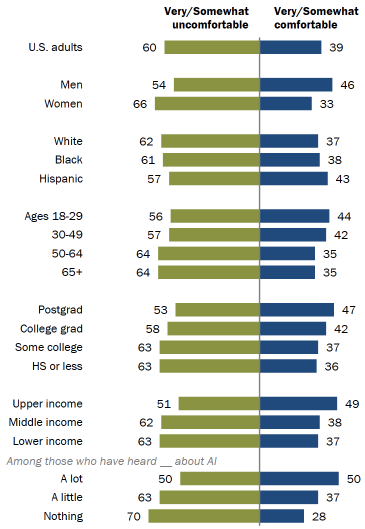 Artificial intelligence has become something of a buzzword, particularly in healthcare: nearly every company that comes along says it using the technology to help fix inefficiencies in the system.Whether or not they actually are doing so is another conversation; the real problem is that it doesn’t seem like anyone stopped to ask patients how they feel about this.
Artificial intelligence has become something of a buzzword, particularly in healthcare: nearly every company that comes along says it using the technology to help fix inefficiencies in the system.Whether or not they actually are doing so is another conversation; the real problem is that it doesn’t seem like anyone stopped to ask patients how they feel about this.
According to a recent survey from Pew shows that a significant portion of them are not ready for AI to be a part of the healthcare system, and that cuts across every demographic group.
Of the 11,004 panelists surveyed, 60% say they would feel uncomfortable if their own health care provider relied on AI to do things like diagnose disease and recommend treatments, while only 39% said they would feel comfortable.
They also don’t believe it will improve their health outcomes, with only 38% saying that AI will have a positive impact, 33% saying it would lead to worse outcomes, and the other 27% saying it wouldn’t make much difference either way. A majority also believe that the use of artificial intelligence will make the patient-provider relationship worse, and only 13% say it would be better.
The news wasn’t all bad: 40% said that the use of AI in health and medicine would reduce, rather than increase, the number of mistakes made by health care providers, and a majority also think the technology will help solve some of the problems caused by racial and ethnic bias, while only 15% said it will make it worse.
What patients really want, though, is for health care providers to slow down; 75% think that the pace of adoption is too fast, and that they don’t fully know the risks yet.
No cohort approves of AI in healthcare
 The report broke down approval of AI by demographics, including gender, age, income, and education level, and found that there was not one cohort that had a majority that approved of the use of AI.
The report broke down approval of AI by demographics, including gender, age, income, and education level, and found that there was not one cohort that had a majority that approved of the use of AI.
While men were more open than women, it was still only 46% approval and 54% disapproval, compared to 66% disapproval, and 33% approval, for women.
Age also didn’t make that much of a difference, with no age cohort having a majority feeling comfortable: 44% of 18 to 29 year olds approved of the use of AI, while the same could be said about 35% of those above the age of 50. And neither did race: approval among white respondents was 37% and 38% among Black respondents, while 43% of Hispanics approved.
While the most educated and the highest income earners approved of AI more than their counterparts, again, it was not a majority.
The closest AI came to overall approval was among those who say they have heard a lot about artificial intelligence, with 50%, compared to 37% of those who heard a little about it, and 28% of those who have heard nothing.
AI for skin care but not for mental health
The survey also asked for views on four specific applications of AI in healthcare: tools for skin cancer screening; robots that can perform parts of surgery; recommendations for pain management following surgery; and chatbots designed to support a person’s mental health.
For AI to being used for their own skin cancer screening, 65% say that they would definitely or probably want it, while 55% believe that AI would make skin cancer diagnoses more accurate, and 52% describe it as a major advance.
When it comes to AI for pain management recommendations, however, only 31% said they would want this kind of AI guiding their pain management treatment, while two-thirds 67% say they would not, and only 26% believe that pain treatment would get better with AI, while 40% said it would make little difference, and 32% said it would lead to worse pain care. Meanwhile, a slightly larger percentage, 40%, were in favor of performing surgery with AI-driven robots, while 59% who say they would not want this.
The biggest resistance, though, came with the use AI chatbots designed to support mental health: 79% say they would not want to use an AI chatbot if they were seeking mental health support, while only 20% say they would.
In addition, 46% say these AI chatbots should only be used by people who are also seeing a therapist, while 23% of Americans say that such chatbots should be available to people regardless of whether they are also seeing a therapist. Nearly a third, 28%, said they should not be available to people at all.
















